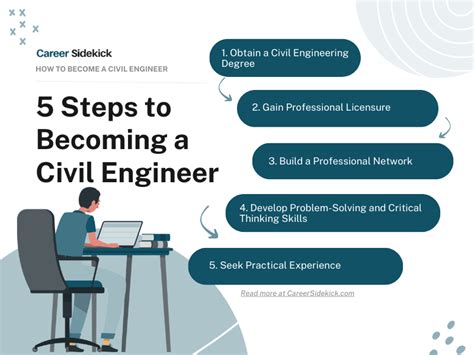The medical technology industry is rapidly growing, and the demand for skilled professionals is on the rise. With the increasing use of technology in healthcare, medical technology (med-tech) companies are developing innovative solutions to improve patient outcomes, streamline clinical workflows, and reduce costs. If you're interested in pursuing a career in this field, here are 5 steps to become a med-tech professional.
Step 1: Gain Relevant Education and Training
To enter the med-tech industry, you'll need a strong foundation in science, technology, engineering, and mathematics (STEM). Here are some educational pathways to consider:
- Earn a bachelor's degree in a relevant field such as biomedical engineering, computer science, or healthcare administration.
- Pursue a master's degree in a specialized field like medical device engineering, healthcare informatics, or biomedical data science.
- Consider earning a certification in a specific area, such as clinical engineering or healthcare information and management systems (HIMSS).

Key Skills to Focus On
When selecting a program, focus on developing the following key skills:
- Programming languages like Python, Java, or C++
- Data analysis and visualization tools like Tableau, Power BI, or D3.js
- Familiarity with medical devices, equipment, and software
- Understanding of healthcare regulations, such as HIPAA and FDA guidelines
- Strong problem-solving, communication, and collaboration skills
Step 2: Build a Strong Foundation in Healthcare
To succeed in med-tech, you need to understand the healthcare industry, including its challenges, trends, and stakeholders. Here are some ways to build your foundation:
- Take courses or attend workshops on healthcare policy, healthcare systems, and medical terminology.
- Read industry publications, such as HealthLeaders, Healthcare IT News, or Medical Device and Diagnostic Industry.
- Join professional organizations, like the Healthcare Information and Management Systems Society (HIMSS) or the Medical Device Manufacturers Association (MDMA).
- Network with healthcare professionals, including clinicians, administrators, and medical device experts.

Understand the Med-Tech Landscape
Familiarize yourself with the med-tech industry, including its segments, trends, and innovations. Some key areas to explore include:
- Medical devices, such as diagnostic equipment, implants, and wearables
- Healthcare IT, including electronic health records (EHRs), telemedicine, and health information exchanges (HIEs)
- Personalized medicine, genomics, and precision health
- Digital health, including mobile health (mHealth), health analytics, and artificial intelligence (AI)
Step 3: Develop Your Technical Skills
Med-tech professionals need a strong technical skill set, including programming, data analysis, and software development. Here are some technical skills to focus on:
- Programming languages like Python, Java, or C++
- Data analysis and visualization tools like Tableau, Power BI, or D3.js
- Familiarity with medical devices, equipment, and software
- Understanding of machine learning, AI, and deep learning concepts
- Experience with cloud computing platforms like AWS, Azure, or Google Cloud

Certifications and Bootcamps
Consider earning certifications or attending bootcamps to enhance your technical skills, such as:
- Certified Associate in Python Programming (CAP)
- Certified Data Scientist (CDS)
- Certified Healthcare Information and Management Systems (CHIMS)
- Med-tech bootcamps, like the Med-Tech Bootcamp or the Healthcare Technology Bootcamp
Step 4: Gain Practical Experience
Practical experience is essential in med-tech, where professionals need to apply theoretical knowledge to real-world problems. Here are some ways to gain practical experience:
- Internships or co-op programs with med-tech companies or healthcare organizations
- Research projects or academic collaborations with med-tech focus
- Volunteer work or hackathons focused on healthcare innovation
- Participate in med-tech competitions, like the Med-Tech Innovation Competition or the Healthcare Innovation Challenge

Build a Strong Network
Networking is critical in med-tech, where professionals need to collaborate with clinicians, administrators, and other stakeholders. Here are some ways to build your network:
- Attend industry conferences, like the HIMSS Annual Conference or the Medical Device Manufacturers Association (MDMA) Annual Meeting
- Join online communities, like the Med-Tech Forum or the Healthcare Technology subreddit
- Connect with professionals on LinkedIn and engage in online discussions
Step 5: Stay Up-to-Date with Industry Trends
The med-tech industry is rapidly evolving, with new innovations and trends emerging regularly. Here are some ways to stay up-to-date:
- Follow industry leaders and experts on social media
- Read industry publications, like HealthLeaders, Healthcare IT News, or Medical Device and Diagnostic Industry
- Attend webinars, workshops, or conferences focused on med-tech innovation
- Participate in online forums or discussion groups focused on med-tech trends

Embracing Lifelong Learning
Med-tech professionals need to commit to lifelong learning, staying current with the latest technologies, trends, and innovations. Here are some strategies to embrace lifelong learning:
- Set aside time for self-directed learning, whether it's reading industry publications or taking online courses
- Seek out mentors or coaches who can provide guidance and support
- Participate in peer-to-peer learning, sharing knowledge and experiences with colleagues






What are the most in-demand med-tech jobs?
+Some of the most in-demand med-tech jobs include medical device engineers, healthcare IT specialists, data analysts, and clinical researchers.
What are the key skills required for a med-tech career?
+Key skills required for a med-tech career include programming languages, data analysis, medical device knowledge, and understanding of healthcare regulations.
How can I stay up-to-date with med-tech industry trends?
+Follow industry leaders, read industry publications, attend webinars and conferences, and participate in online forums to stay up-to-date with med-tech industry trends.
By following these 5 steps, you can set yourself up for success in the med-tech industry. Remember to stay curious, keep learning, and always be open to new opportunities and challenges.
